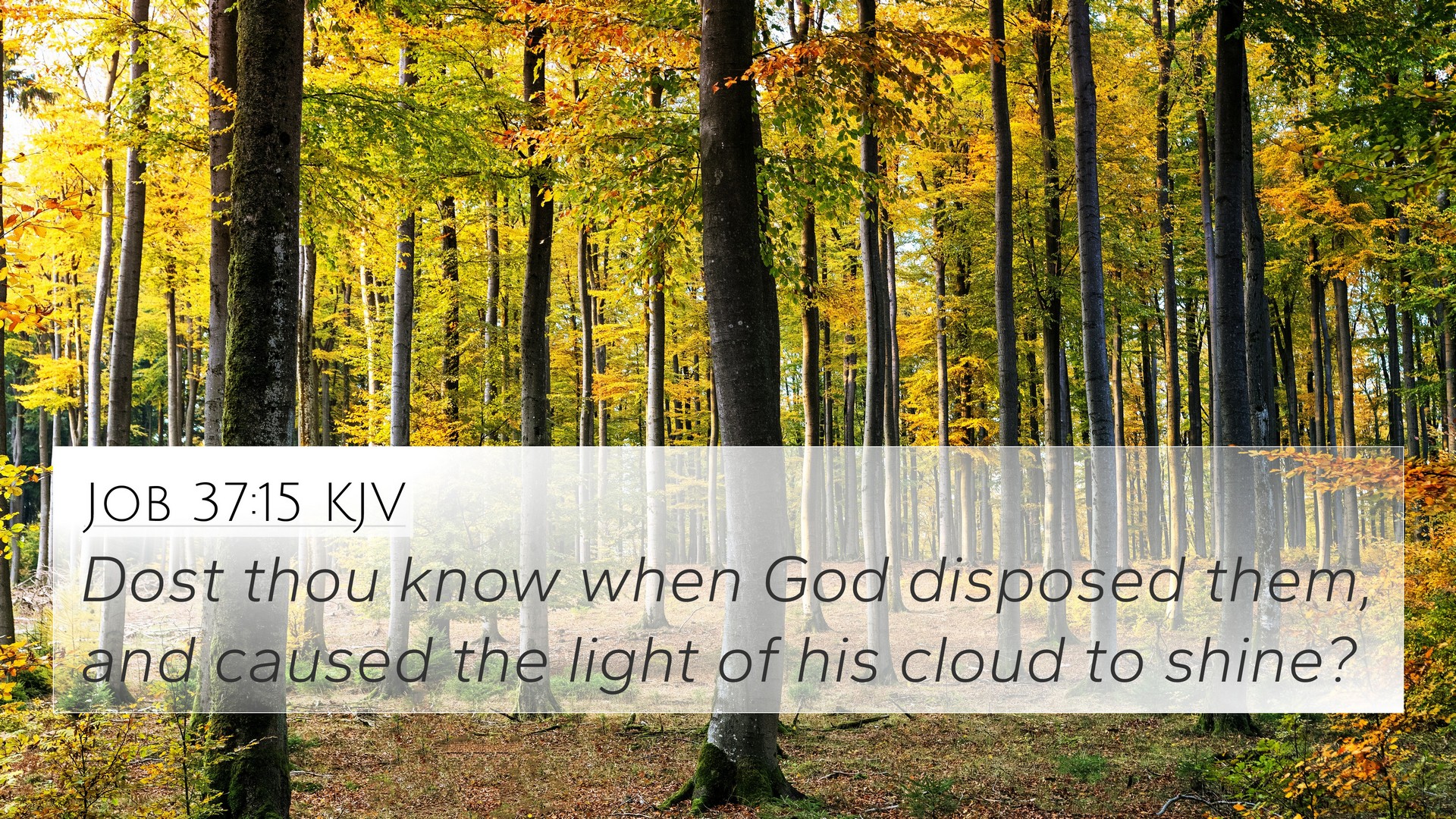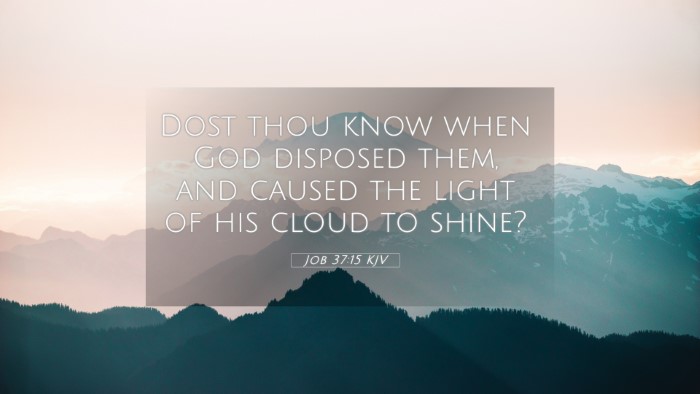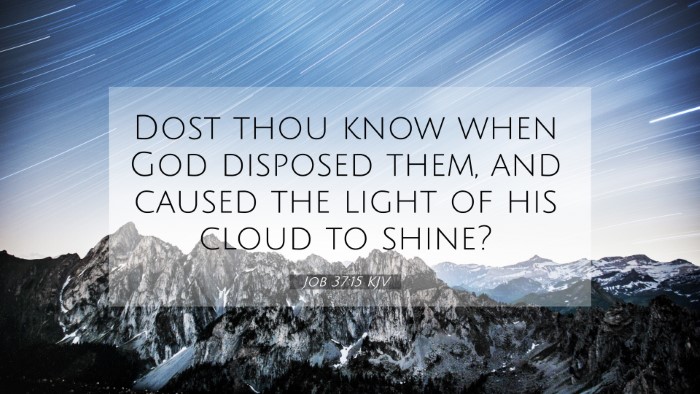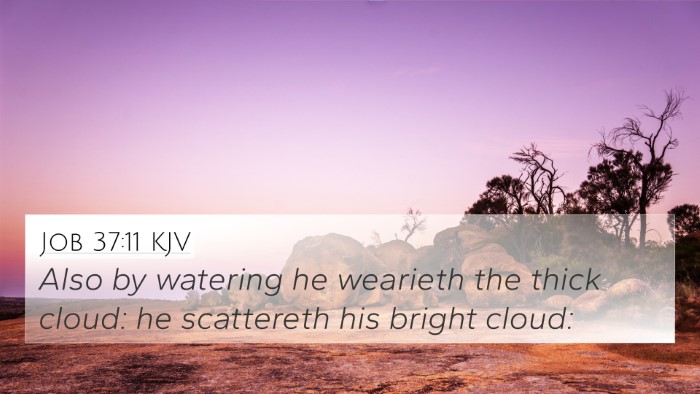Old Testament
Genesis Exodus Leviticus Numbers Deuteronomy Joshua Judges Ruth 1 Samuel 2 Samuel 1 Kings 2 Kings 1 Chronicles 2 Chronicles Ezra Nehemiah Esther Job Psalms Proverbs Ecclesiastes Song of Solomon Isaiah Jeremiah Lamentations Ezekiel Daniel Hosea Joel Amos Obadiah Jonah Micah Nahum Habakkuk Zephaniah Haggai Zechariah MalachiJob 37:15 Similar Verses
Job 37:15 Cross References
Dost thou know when God disposed them, and caused the light of his cloud to shine?
Uncover the Rich Themes and Topics of This Bible Verse
Listed below are the Bible themes associated with Job 37:15. We invite you to explore each theme to gain deeper insights into the Scriptures.
Job 37:15 Cross Reference Verses
This section features a detailed cross-reference designed to enrich your understanding of the Scriptures. Below, you will find carefully selected verses that echo the themes and teachings related to Job 37:15 KJV. Click on any image to explore detailed analyses of related Bible verses and uncover deeper theological insights.
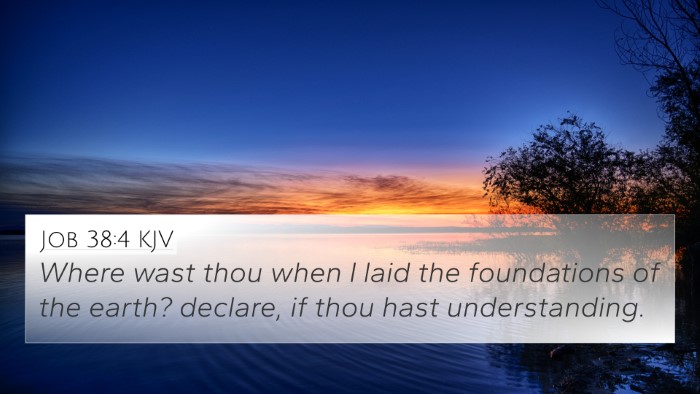
Job 38:4 (KJV) »
Where wast thou when I laid the foundations of the earth? declare, if thou hast understanding.
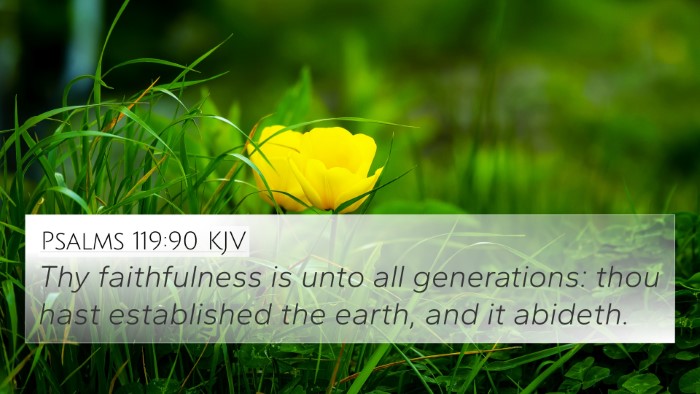
Psalms 119:90 (KJV) »
Thy faithfulness is unto all generations: thou hast established the earth, and it abideth.

Isaiah 40:26 (KJV) »
Lift up your eyes on high, and behold who hath created these things, that bringeth out their host by number: he calleth them all by names by the greatness of his might, for that he is strong in power; not one faileth.
Job 37:15 Verse Analysis and Similar Verses
Understanding Job 37:15
Job 37:15 states: "Do you know when God lays his command upon them and causes the lightning of his cloud to shine?" This verse highlights the immense power and authority of God over nature, specifically in the context of storms and lightning.
Commentary Summary
This verse, situated in the dialogue between Elihu and Job, emphasizes God's sovereignty and the divine wisdom behind natural phenomena. Below is a summary of insights derived from public domain commentaries:
-
Matthew Henry:
Henry focuses on the observation that natural events, like thunderstorms, are orchestrated by God's command. He emphasizes that these displays of power serve not only as reminders of God's authority but also as sources of awe and wonder for humanity. Henry highlights the symmetry between God's commands and the world's obedience.
-
Albert Barnes:
Barnes asserts that this verse reveals God’s role as the creator and sustainer of the universe. By questioning Job, presumably to provoke contemplation about the divine purpose, he illustrates how God oversees natural events. Barnes points out that understanding such divine governance can lead one to greater humility and reverence toward God.
-
Adam Clarke:
Clarke discusses the implications of God’s control over natural elements. He interprets the "lightning of his cloud" as both a literal and metaphorical representation of God’s power. Clarke also invites readers to connect this verse with the broader themes of divine justice and the human condition amidst suffering, arguing that awareness of God's command over nature should encourage a deeper faith and trust in God's plans.
Bible Verse Cross-References
In exploring Job 37:15, several cross-referenced passages provide further insight into the themes presented. Below are notable related verses:
- Psalm 29:3-4: "The voice of the Lord is over the waters; the God of glory thunders, the Lord thunders over the mighty waters. The voice of the Lord is powerful; the voice of the Lord is full of majesty." This correlates with God's authority over nature.
- Isaiah 40:12: "Who has measured the waters in the hollow of his hand, or with the breadth of his hand marked off the heavens?" This verse ties into God’s sovereign control over creation.
- Jeremiah 10:13: "When He utters His voice, there is a tumult of waters in the heavens, and He causes the vapors to ascend from the ends of the earth." This reinforces the theme of God’s power in nature.
- Matthew 8:26: "And He said to them, 'Why are you afraid, O you of little faith?' Then He rose and rebuked the winds and the sea, and there was a great calm." This presents a New Testament example of Jesus demonstrating authority over the forces of nature.
- Job 38:22-23: "Have you entered the storehouses of the snow, or have you seen the storehouses of the hail, which I have reserved for the time of trouble, for the day of battle and war?" This reinforces God’s control and purpose in His creation.
- Proverbs 30:4: "Who has ascended to heaven and come down? Who has gathered the wind in his fists? Who has wrapped up the waters in a garment? Who has established all the ends of the earth?" This verse complements Job’s reflections on divine power.
- Romans 1:20: "For since the creation of the world God's invisible qualities—his eternal power and divine nature—have been clearly seen, being understood from what has been made, so that people are without excuse." This highlights the revelation of God’s nature through creation.
Thematic Connections
The themes present in Job 37:15 connect to various broader biblical themes:
-
The Sovereignty of God:
God's ultimate control over nature and events is a constant theme throughout scriptures. From the plagues in Egypt (Exodus 7-12) to the stilling of storms by Jesus (Mark 4:39), God's authority is portrayed time and again.
-
The Wonder of Creation:
The majesty of creation and natural wonders serve as reminders of God’s creative power, appearing prominently in Job, Psalms, and other texts, reinforcing the idea that nature testifies to the Creator's greatness.
-
Divine Justice:
As Job grapples with his suffering, the need to understand God’s justice and purpose becomes clear. The dialogues also reflect how humans are often in dialogue with divine wisdom concerning their trials.
Tools for Bible Cross-Referencing
For those looking to engage deeper with Job 37:15 and its themes, the following tools can enhance your understanding:
- Bible Concordance: An essential resource for finding words and topics throughout the Bible, allowing connections to be made easily.
- Bible Cross-Reference Guide: A structured guide to link similar themes and passages across both the Old and New Testaments.
- Cross-Reference Bible Study: A method in which scriptures are analyzed in conjunction with one another to illuminate themes and narratives.
Conclusion
Job 37:15 serves as a profound reminder of God's absolute dominion over the natural world, encouraging believers to recognize His power and majesty. Through cross-referencing with related scriptures and utilizing tools for deeper study, one can uncover the rich tapestry of God’s revelation in creation and His enduring presence in the lives of His people.
